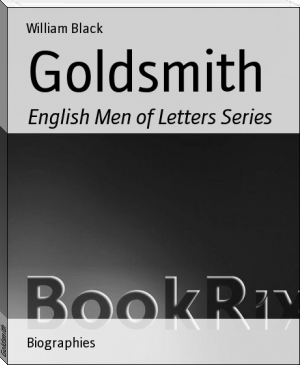Goldsmith - William Black (free novel reading sites TXT) 📗

- Author: William Black
Book online «Goldsmith - William Black (free novel reading sites TXT) 📗». Author William Black
The surprising part of this episode in Goldsmith's life is that he did really receive the appointment; in fact he was called upon to pay L10 for the appointment-warrant. In this emergency he went to the proprietor of the _Critical Review_, the rival of the _Monthly_, and obtained some money for certain anonymous work which need not be mentioned in detail here. He also moved into another garret, this time in Green-Arbour Court, Fleet Street, in a wilderness of slums. The Coromandel project, however, on which so many hopes had been built, fell through. No explanation of the collapse could be got from either Goldsmith himself, or from Dr. Milner. Mr. Forster suggests that Goldsmith's inability to raise money for his outfit may have been made the excuse for transferring the appointment to another; and that is probable enough; but it is also probable that the need for such an excuse was based on the discovery that Goldsmith was not properly qualified for the post. And this seems the more likely, that Goldsmith immediately afterwards resolved to challenge examination at Surgeons' Hall. He undertook to write four articles for the _Monthly Review_; Griffiths became surety to a tailor for a fine suit of clothes; and thus equipped, Goldsmith presented himself at Surgeons' Hall. He only wanted to be passed as hospital mate; but even that modest ambition was unfulfilled. He was found not qualified; and returned, with his fine clothes, to his Fleet-Street den. He was now thirty years of age (1758); and had found no definite occupation in the world.
CHAPTER V.
BEGINNING OF AUTHORSHIP.--THE BEE.
During the period that now ensued, and amid much quarrelling with Griffiths and hack-writing for the _Critical Review_, Goldsmith managed to get his _Enquiry into the Present State of Polite Learning in Europe_ completed; and it is from the publication of that work, on the 2nd of April, 1759, that we may date the beginning of Goldsmith's career as an author. The book was published anonymously; but Goldsmith was not at all anxious to disclaim the parentage of his first-born; and in Grub Street and its environs, at least, the authorship of the book was no secret. Moreover there was that in it which was likely to provoke the literary tribe to plenty of fierce talking. The _Enquiry_ is neither more nor less than an endeavour to prove that criticism has in all ages been the deadly enemy of art and literature; coupled with an appeal to authors to draw their inspiration from nature rather than from books, and varied here and there by a gentle sigh over the loss of that patronage, in the sunshine of which men of genius were wont to bask. Goldsmith, not having been an author himself, could not have suffered much at the hands of the critics; so that it is not to be supposed that personal feeling dictated this fierce onslaught on the whole tribe of critics, compilers, and commentators. They are represented to us as rank weeds, growing up to choke all manifestations of true art. "Ancient learning," we are told at the outset, "may be distinguished into three periods: its commencement, or the age of poets; its maturity, or the age of philosophers; and its decline, or the age of critics." Then our guide carries us into the dark ages; and, with lantern in hand, shows us the creatures swarming there in the sluggish pools--"commentators, compilers, polemic divines, and intricate metaphysicians." We come to Italy: look at the affectations with which the Virtuosi and Filosofi have enchained the free spirit of poetry. "Poetry is no longer among them an imitation of what we see, but of what a visionary might wish. The zephyr breathes the most exquisite perfume; the trees wear eternal verdure; fawns, and dryads, and hamadryads, stand ready to fan the sultry shepherdess, who has forgot, indeed, the prettiness with which Guarini's shepherdesses have been reproached, but is so simple and innocent as often to have no meaning. Happy country, where the pastoral age begins to revive!--where the wits even of Rome are united into a rural group of nymphs and swains, under the appellation of modern Arcadians!--where in the midst of porticoes, processions, and cavalcades, abbes turned shepherds and shepherdesses without sheep indulge their innocent _divertimenti_!"
In Germany the ponderous volumes of the commentators next come in for animadversion; and here we find an epigram, the quaint simplicity of which is peculiarly characteristic of Goldsmith. "Were angels to write books," he remarks, "they never would write folios." But Germany gets credit for the money spent by her potentates on learned institutions; and it is perhaps England that is delicately hinted at in these words: "Had the fourth part of the immense sum above-mentioned been given in proper rewards to genius, in some neighbouring countries, it would have rendered the name of the donor immortal, and added to the real interests of society." Indeed, when we come to England, we find that men of letters are in a bad way, owing to the prevalence of critics, the tyranny of booksellers, and the absence of patrons. "The author, when unpatronized by the great, has naturally recourse to the bookseller. There cannot perhaps be imagined a combination more prejudicial to taste than this. It is the interest of the one to allow as little for writing, and of the other to write as much as possible. Accordingly, tedious compilations and periodical magazines are the result of their joint endeavours. In these circumstances the author bids adieu to fame, writes for bread, and for that only. Imagination is seldom called in. He sits down to address the venal muse with the most phlegmatic apathy; and, as we are told of the Russian, courts his mistress by falling asleep in her lap. His reputation never spreads in a wider circle than that of the trade, who generally value him, not for the fineness of his compositions, but the quantity he works off in a given time.
"A long habit of writing for bread thus turns the ambition of every author at last into avarice. He finds that he has written many years, that the public are scarcely acquainted even with his name; he despairs of applause, and turns to profit, which invites him. He finds that money procures all those advantages, that respect, and that ease which he vainly expected from fame. Thus the man who, under the protection of the great, might have done honour to humanity, when only patronized by the bookseller, becomes a thing little superior to the fellow who works at the press."
Nor was he afraid to attack the critics of his own day, though he knew that the two Reviews for which he had recently been writing would have something to say about his own _Enquiry_. This is how he disposes of the _Critical_ and the _Monthly_: "We have two literary Reviews in London, with critical newspapers and magazines without number. The compilers of these resemble the commoners of Rome; they are all for levelling property, not by increasing their own, but by diminishing that of others. The man who has any good-nature in his disposition must, however, be somewhat displeased to see distinguished reputations often the sport of ignorance,--to see, by one false pleasantry, the future peace of a worthy man's life disturbed, and this only because he has unsuccessfully attempted to instruct or amuse us. Though ill-nature is far from being wit, yet it is generally laughed at as such. The critic enjoys the triumph, and ascribes to his parts what is only due to his effrontery. I fire with indignation, when I see persons wholly destitute of education and genius indent to the press, and thus turn book-makers, adding to the sin of criticism the sin of ignorance also; whose trade is a bad one, and who are bad workmen in the trade." Indeed there was a good deal of random hitting in the _Enquiry_, which was sure to provoke resentment. Why, for example, should he have gone out of his way to insult the highly respectable class of people who excel in mathematical studies? "This seems a science," he observes, "to which the meanest intellects are equal. I forget who it is that says 'All men might understand mathematics if they would.'" There was also in the first edition of the _Enquiry_ a somewhat ungenerous attack on stage-managers, actors, actresses, and theatrical things in general; but this was afterwards wisely excised. It is not to be wondered at that, on the whole, the _Enquiry_ should have been severely handled in certain quarters. Smollett, who reviewed it in the _Critical Review_, appears to have kept his temper pretty well for a Scotchman; but Kenrick, a hack employed by Griffiths to maltreat the book in the _Monthly Review_, flourished his bludgeon in a brave manner. The coarse personalities and malevolent insinuations of this bully no doubt hurt Goldsmith considerably; but, as we look at them now, they are only remarkable for their dulness. If Griffiths had had another Goldsmith to reply to Goldsmith, the retort would have been better worth reading: one can imagine the playful sarcasm that would have been dealt out to this new writer, who, in the very act of protesting against criticism, proclaimed himself a critic. But Goldsmiths are not always to be had when wanted; while Kenricks can be bought at any moment for a guinea or two a head.
Goldsmith had not chosen literature as the occupation of his life; he had only fallen back on it, when other projects failed. But it is quite possible that now, as he began to take up some slight position as an author, the old ambition of distinguishing himself--which had flickered before his imagination from time to time--began to enter into his calculations along with the more pressing business of earning a livelihood. And he was soon to have an opportunity of appealing to a wider public than could have been expected for that erudite treatise on the arts of Europe. Mr. Wilkie, a bookseller in St. Paul's Churchyard, proposed to start a weekly magazine, price threepence, to contain essays, short stories, letters on the topics of the day, and so forth, more or less after the manner of the _Spectator_. He asked Goldsmith to become sole contributor. Here, indeed, was a very good opening; for, although there were many magazines in the field, the public had just then a fancy for literature in small doses; while Goldsmith, in entering into the competition, would not be hampered by the dulness of collaborateurs. He closed with Wilkie's offer; and on the 6th of October, 1759, appeared the





Comments (0)